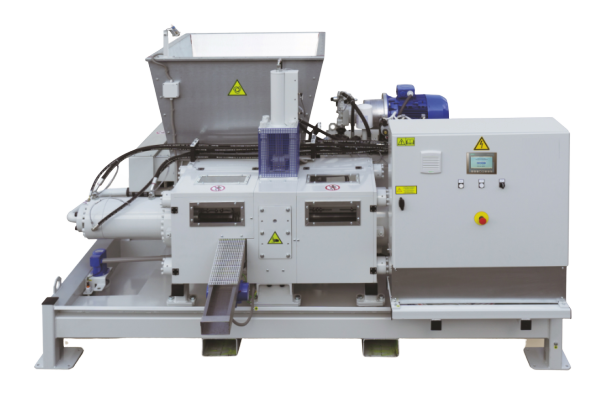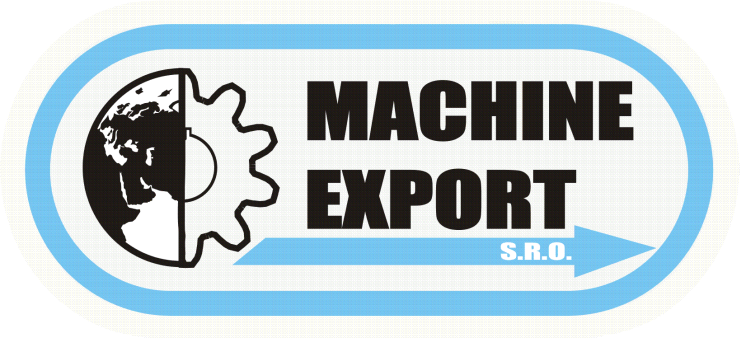
Info
Info

BrikStar M / MD
Placing the presses
Briquetting presses can be connected at the end of the existing system of conveyance of the chips from machine centres, or can work separately, with a preliminary high-capacity bin or a crusher. The press hoppers are mostly fed by a screw conveyor from a large-capacity material bin which is situated near to the press. The presses are equipped with a level sensor for monitoring the material quantity in the hopper. The level sensor signal is used for the control of the press operation as well as with an option of controlling an external conveyor transporting the material into the press hopper. It is also possible to fill the system manually or through a lifting device which dumps chips from containers into the press hopper. The vibrating trough or a belt conveyor serve for transportation of compacted briquettes from the press to the shipping containers. The height of the vibrating trough outlet is 600 mm.
Materials for pressing
Metal chips from the machining of cast iron, steel or nonferrous metals and grinding sludge
Other materials of similar properties can be exposed to performance test, which is performed by the BRIKLIS personnel in the BRIKLIS test room free of charge.
Briquette properties
The briquettes have a shape of cylinder of various diameters, see specifications.
Specific weight of aluminium chip briquette is from 1,500 to 2,200 kg/m3
Specific weight of steel chip briquette is from 4,500 to 5,200 kg/m3
Specific weight of cast iron chip briquette is from 4,500 to 6,000 kg/m3
Specific weight of brass chip briquette is from 5,500 to 6,800 kg/m3
Standard equipment
+ 20 dm3 hopper with feeding screw
+ Vibration chute system for transport of briquettes into the container
+ Oil cooler for an uninterrupted operation
+ Level sensor in the material hopper
Briquetting presses can be connected at the end of the existing system of conveyance of the chips from machine centres, or can work separately, with a preliminary high-capacity bin or a crusher. The press hoppers are mostly fed by a screw conveyor from a large-capacity material bin which is situated near to the press. The presses are equipped with a level sensor for monitoring the material quantity in the hopper. The level sensor signal is used for the control of the press operation as well as with an option of controlling an external conveyor transporting the material into the press hopper. It is also possible to fill the system manually or through a lifting device which dumps chips from containers into the press hopper. The vibrating trough or a belt conveyor serve for transportation of compacted briquettes from the press to the shipping containers. The height of the vibrating trough outlet is 600 mm.
Materials for pressing
Metal chips from the machining of cast iron, steel or nonferrous metals and grinding sludge
Other materials of similar properties can be exposed to performance test, which is performed by the BRIKLIS personnel in the BRIKLIS test room free of charge.
Briquette properties
The briquettes have a shape of cylinder of various diameters, see specifications.
Specific weight of aluminium chip briquette is from 1,500 to 2,200 kg/m3
Specific weight of steel chip briquette is from 4,500 to 5,200 kg/m3
Specific weight of cast iron chip briquette is from 4,500 to 6,000 kg/m3
Specific weight of brass chip briquette is from 5,500 to 6,800 kg/m3
Standard equipment
+ 20 dm3 hopper with feeding screw
+ Vibration chute system for transport of briquettes into the container
+ Oil cooler for an uninterrupted operation
+ Level sensor in the material hopper
Economic benefit and main advantages in the usage of briquetting presses
+ Raw material saving in the foundry
+ Saving of cooling oil that otherwise leaves the plant with unprocessed chips
+ Possible return on investment until one year, depends on local conditions
+ High quality of briquettes, low residual moisture content
+ Profit from the sale of briquettes
+ Reduction of responsibility for possible contamination of the environment
+ Reduction of costs for the handling and storage of contaminated chips
+ Minimum demands on operators if a large-volume hopper is used
+ Optimization of investment costs thanks to the possibility to choice from a wide range of outputs
+ Raw material saving in the foundry
+ Saving of cooling oil that otherwise leaves the plant with unprocessed chips
+ Possible return on investment until one year, depends on local conditions
+ High quality of briquettes, low residual moisture content
+ Profit from the sale of briquettes
+ Reduction of responsibility for possible contamination of the environment
+ Reduction of costs for the handling and storage of contaminated chips
+ Minimum demands on operators if a large-volume hopper is used
+ Optimization of investment costs thanks to the possibility to choice from a wide range of outputs
Big benefit of the briquetting presses is the possibility of recycling costly raw materials. Chips arising in aluminium machining are pressed in metal briquettes of a defined shape. Briquette melting produces more molten metal than melting of bulk chips. Furthermore, during the pressing the cooling oil, that used to leave the press together with unprocessed chips, is caught. The volume of waste is decreased eight times by briquetting, and so the transport and storage are cheaper.
Re-using of cooling fluid from machining
Every briquetting press is equiped with cooling fluid separator in standart, which is in specified amount evacuated from the machine with chips by chip conveyor. After separation of liquid from chips the liquid goes through the sieve for catching other dirts contained in liquid from machining. After that cooling liquid can be reused in machining centre without any other treatments. also if it is required cooling liquid can go from press through paper filtration if machining centre is equiped with it.
Re-using of cooling fluid from machining
Every briquetting press is equiped with cooling fluid separator in standart, which is in specified amount evacuated from the machine with chips by chip conveyor. After separation of liquid from chips the liquid goes through the sieve for catching other dirts contained in liquid from machining. After that cooling liquid can be reused in machining centre without any other treatments. also if it is required cooling liquid can go from press through paper filtration if machining centre is equiped with it.
Optional accessories
+ Chips vibrating sorter
+ Material screw or chain conveyors
+ Collection tray for the cooling liquid pressed out, with a pump
+ Control system of the briquetting press for the control of conveyors on the basis of signals from the sensors of the material level in the hopper
+ Hydraulic oil for ambient temperatures below + 5 °C
+ Optional hoppers
Auxiliary equipment
+ Scrap metal crushers
+ Long chips must be broken by a suitable crushers before briquetting. We offer solutions from various manufacturers depending on the chip type and the required
output. Principal condition for successful application of crushers are clean chips without residues of bars, products or tools.
+ Chips vibrating sorter
+ Material screw or chain conveyors
+ Collection tray for the cooling liquid pressed out, with a pump
+ Control system of the briquetting press for the control of conveyors on the basis of signals from the sensors of the material level in the hopper
+ Hydraulic oil for ambient temperatures below + 5 °C
+ Optional hoppers
Auxiliary equipment
+ Scrap metal crushers
+ Long chips must be broken by a suitable crushers before briquetting. We offer solutions from various manufacturers depending on the chip type and the required
output. Principal condition for successful application of crushers are clean chips without residues of bars, products or tools.
Technical data
| Technical and running conditions | |
|---|---|
| allowed dimension of input material | to 30 mm |
| maximal running pressure | 240 bar (24MPa) |
| maximal running oil temperature | 60 °C |
| outside working temeprature | from +5 to +35 °C |
| General technical parameters | |
|---|---|
| power supply device | 400 V |
| control voltage | 24 V |
| protection of electrical elements | IP54 |
| equipment noise | 77 dB |
| number of possible running shifts for press | 3 směny |
| Type | Ø briquette mm |
Pressure MPa |
Output kg / hod |
Pump output kW |
Press dimensions mm |
|---|---|---|---|---|---|
| BrikStar M - 7 | 40 | 320 | 100 | 7,5 | 2050 x 1200 x 1740 |
| BrikStar M/MD - 15 | 55 - 60 | 290 - 350 | 200 / 280 | 15 | 3320 x 2080 x 1940 |
| BrikStar M/MD - 22 | 60 - 70 | 290 - 350 | 300 / 400 | 22 | 3620 x 2300 x 2460 |
| BrikStar M/MD - 30 | 70 - 80 | 290 - 350 | 500 / 650 | 30 | 4620 x 2590 x 2800 |
| BrikStar M - 40 | 80 - 90 | 290 - 350 | 600 / 800 | 40 | 4620 x 2590 x 2800 |


Aluminium
Copper
Bronze
Titan
Lead
Cast-iron
Zink dust
Grinding sludge
Steel
Other materials
Your
sample
?
sample
?
The BrikStar M and MD presses have been developed for pressing of metal chips arising from the machining of cast iron, steel or nonferrous metals and grinding on the basis of 20 years of experience. BrikStar M and MD presses are designed for medium to large plants with one-shift or multi-shift operation. They have almost identical dimensions, but differ design. BrikStar MD briquetting presses reach higher outputs thanks to design modification shortening the time of the working cycle.
Unique pressing method
The presses feature compact design, modern control, reliable hydraulic pressing device, which enables maximum compaction of material. Pressing takes place in a cylindrical die closed from both sides by pressing tools. The pressing power in the die reaches up to 400 MPa and it has effect on both bases of the cylindrical briquette. This unique way of pressing ensures the high and proportional compaction of the material in the entire volume of the briquette. An average length of a briquette is 1.5 times bigger than its diameter. Specific weight of cast iron is up to 5,300 kg/m3. Only short loose metal chips are suitable for briquetting.
Unique pressing method
The presses feature compact design, modern control, reliable hydraulic pressing device, which enables maximum compaction of material. Pressing takes place in a cylindrical die closed from both sides by pressing tools. The pressing power in the die reaches up to 400 MPa and it has effect on both bases of the cylindrical briquette. This unique way of pressing ensures the high and proportional compaction of the material in the entire volume of the briquette. An average length of a briquette is 1.5 times bigger than its diameter. Specific weight of cast iron is up to 5,300 kg/m3. Only short loose metal chips are suitable for briquetting.










.png)